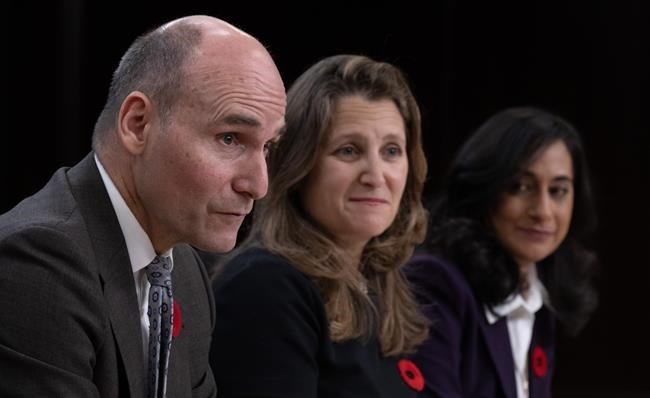OTTAWA — As the federal government faces mounting pressure to address a national housing crisis, it announced on Tuesday that it would allow more than 2,800 homes to be built on six of its surplus properties across Canada.
"These are significant steps forward, but we know we need to do more," Procurement Minister Jean-Yves Duclos said Tuesday in Ottawa.
The Liberals have been making a series of housing announcements in the lead-up to the fall economic statement, at a time when the Conservatives — and their focus on affordability — have been riding high in opinion polls.
The latest commitment would put the federal government back on track to make way for the development of about 29,200 housing units on federal lands by 2029, while ensuring many of them are considered affordable.
Canada Lands Co., the Crown corporation that manages federal properties, is setting a new minimum target for housing projects so that at least 20 per cent of units must be affordable, Duclos said.
This target will come into play when there is no municipal target for affordable housing already in place, or when that target is lower.
The Crown corporation said an average of 10 per cent of the residential units it enabled to be built were affordable, but its new strategic plan has set a more ambitious goal.
The Crown corporation expects to enable the construction of about 26,400 units over the next five years, Duclos said.
"This will mean around 5,300 affordable homes in the next five years, which is twice as many as in the last 30 years," he said.
"This is a significant acceleration of providing affordable homes to Canadians but we think — and we know — there is more we can do."
Canada Lands Co., through agreements with developers, will be unlocking six federal surplus properties to allow the construction of 2,800 additional units by March 2024 in Calgary, Edmonton, Ottawa and St. John's, N.L.
That initial amount is expected to include a minimum of 300 units set aside for affordable housing, as the 20 per cent target applies across all projects countrywide, not individual projects.
The announcement on Tuesday noted, for example, that the developments in Edmonton and Ottawa would include affordable homes, while none were listed for the projects in Calgary and St. John's.
When asked whether the federal government will sell off these properties or keep them on its books, Duclos said a mix of strategies may be used.
Tuesday'sannouncement is the latest effort by the federal government to address the national housing crisis by boosting housing supply in the country.
Mike Moffatt, the senior director of policy and innovation at the Smart Prosperity Institute, said the federal government has taken bolder action on housing over the last few months.
But while getting more homes built on federal lands is a good step, the number of units that will be built pales in comparison to what's needed to address the shortage, he said.
The Canada Mortgage and Housing Corp. estimates the country needs to build 3.5 million homes — above the projected pace of building — by 2030 to restore affordability.
"A few thousand here and there, while they certainly help, are just a very small move in the right direction," Moffatt said.
The federal Liberals' attempt to get ahead on the housing file comes as the government faces attacks from opposition parties over the affordability crisis.
Conservatives have seen their support in polling surge since the summer as the party's leader, Pierre Poilievre, pins the blame for the housing crisis on Prime Minister Justin Trudeau.
Among Poilievre's proposed solutions to the crisis is selling off 15 per cent of federal buildings and lands for housing development.
The NDP has also criticized the federal government for its handling of housing policy, calling for more targeted investments in affordable housing, in particular.
Finance Minister Chrystia Freeland, who was present at the news conference, said this announcement "is just the beginning of a much more aggressive approach to using federal lands."
Housing experts have been calling on the federal government to leverage its real-estate portfolio to get more homes built, particularly ones that would be affordable for lower-income Canadians.
Freeland is expected to present a fall economic statement in the coming weeks, and has promised the mini-budget would focus on housing and affordability.
One of the political challenges facing the federal government is that any new measures aimed at boosting the housing supply will take time to show results.
That means even if the Liberals introduce the right policies to speed up construction, Canadians may not see the benefits by the time there's another federal election.
Faced with this challenge, Moffatt said the Liberals may want to look at other policies to help with the affordability crisis at hand.
"I do think there's room to look at areas like rent supplements, like looking at increases in GST cheques, and those kinds of things, to make sure that people can afford to pay the rent," Moffatt said.
"You do need a suite of policies to recognize that we're not going to fix the supply crisis overnight and people are struggling today."
This report by The Canadian Press was first published Nov. 7, 2023.
Nojoud Al Mallees, The Canadian Press




